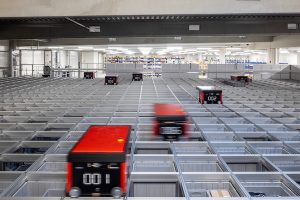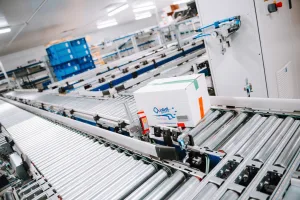Can automation boost food safety standards?
Warehouse automation delivers higher food safety standards, says Thomas Swovick.
ON JUNE’S World Food Safety Day, industry leaders pledged to come together to prioritise ‘safe food now for a healthy tomorrow’. Foodborne diseases are a growing public health problem worldwide and although the World Health Organization (WHO) European Region has the lowest estimated burden of foodborne diseases globally, more than 23 million people in the region fall ill from unsafe food every year, resulting in 5000 deaths. Now, after the experience of a global pandemic, food hygiene standards are seen to be playing an additional role in reducing transmission rates.
Of course, falling short on food safety standards isn’t an option for food and grocery retailers, and as the online and import markets continue to grow, so will the challenges associated with ensuring the produce we eat remains fit for consumption. There are strict protocols within the UK and EU as to how foods should be processed, transported and distributed. In addition, food retailers can increase the safety of their customers by investing in automation solutions that process and pack foodstuffs without the need for human contact. From protecting the produce from the risk of contamination to regulating temperature and storage conditions, automation is often the best answer to keeping our food safe.
Software as a solution
A noticeable trend in the food and beverage industry at present is the use of software to automate complicated processes involved with storing food correctly and providing detailed and up-to-date data to make recalling items easier due to a quality control issue.
Sophisticated warehouse management systems can bring the entire intralogistics supply chain — fulfilment, operations, maintenance and analytics — into one comprehensive ecosystem, guaranteeing adherence to food safety best practices.
For example, systems can be programmed to prevent products with the potential to contaminate each other from being stored in close proximity. This prevents fresh meat and vegetables, which can secrete bacteria-carrying liquid, from being allocated storage space in the same container.
Temperature control is another factor that can be managed by automation. Individual products can be chilled rapidly using automated storage and retrieval systems that blow cold air onto them. Dematic has developed a high-performance, automated case storage, picking and despatch processing solution especially for chilled and frozen goods.
Workforce challenges
The COVID-19 pandemic created workforce challenges across all sectors and the food industry and logistics sector was no exception. Self-isolation led to a shortage of workers and 300,000 short-term grocery workers had to be hired to fill the logistics gaps across the UK.
There were initial concerns about contaminating food products with the virus. Even now, as we know much more about how the virus spreads and with vaccines available, preventing infections within food warehouse teams remains a priority. Automation by design helps keep food safe by separating produce from people and, in the event of a food safety breach, makes the process of product recalls more straightforward with up-to-the-minute track-and-trace functionality. In fact, automation means that recall is now possible right down to the end customer.
So, despite the many challenges that retailers and grocers have endured during the global pandemic, it is now time for them to think about how they can best equip themselves to manage the economic uncertainties and future recovery. Warehouse automation provides a competitive edge and assures consumers that the food they eat consistently meets the highest health standards.
Thomas Swovick, global market development manager – food & beverage, Dematic
For more information, visit www.dematic.com






